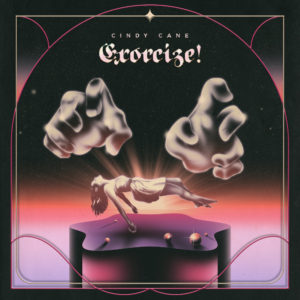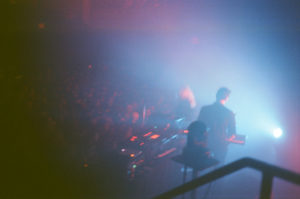Two years after her most punishingly heavy album to date, Chelsea Wolfe returns with a sparse and stripped-down album of mostly acoustic compositions highlighting her skill as a songwriter and uncanny ability to draw empathy and power from the darkness. Just because Birth Of Violence is positioned as an acoustic record don’t expect easy listening. Wolfe stacks these songs with vivid imagery and does not shy away from tough subjects, painting even the most intimate emotions with a sweeping grandeur that leaves the listener in helpless awe of the spectacle.
Wolfe’s music has attracted a myriad of labels over the course of her discography, appropriately so as she has never inhabited one particular sonic style for too long; slow and ponderous doom, apocalyptic post rock, gothic heavy metal, abrasive industrial electronica. But for all the volume of these genres, at her very core Wolfe is a folk musician, skillfully adept at tapping into the sensitive core of emotion and plainly speaking in ways that make even her most fantastical set pieces familiar and relatable.
The album opens with “The Mother Road,” a song that begins with just Wolfe and an acoustic guitar that slowly builds in stages. Strings, synths, and percussion are added in measured doses as Wolfe sings “guess I needed someone to break me, guess I needed someone to shake me up” until a powerful roll of percussion like the breaking of a thunderstorm propels the strings to stratospheric heights while Wolfe sweetly sings “it was you.” This need for change spurred by external forces is a central theme throughout Birth Of Violence, and the personal desire for such has become manifested in Wolfe’s musical approach. The acoustic angle isn’t just a gimmick, it represents freedom and unhindered expression to exorcise emotions in a way that doesn’t hide behind instruments or production.
A lot of this album feels inspired by Wolfe’s time on the road. The necessities of touring lead to feelings of isolation and anxiety born from separation, mentally replaying a past romantic encounter on “American Darkness” that blurs with the reality of performing nightly. “Your eye was trained on me as I stood before you, unbuttoning” is as much a moment from the bedroom with a lover as it is a moment on the stage in front of an audience, merging and twisting the concept of love as Wolfe urges “won’t you dance?” before her old ways kick in and she is back on the road.
“Deranged For Rock & Roll” is probably the most straightforward and textbook Chelsea Wolfe song on the album. The instrumentation here is bigger, full of droning electric chords, distorted percussion and highlighted by carefully strummed acoustic guitar. Lyrically Wolfe is drawing a direct correlation between her personal and professional, she is “deranged” both for her art and because of it. Wolfe “drinks her dreams,” giving herself over to the intoxicating effects of her innermost emotions and then in turns sells her soul. The buyer isn’t the devil or some evil force, it is the audience, and creating her art for consumption is Wolfe’s coping mechanism, a necessary tool for survival.
But in doing so Wolfe reveals that she is not only creating to survive, she has an inherent desire to “Be All Things,” and describes this desire as a kind of self-motivated restlessness that sheds insight into her wide ranging musical styles and also the decision to take a more stripped down approach with this album. Walking the same path is the way to complacency and death, Wolfe purposefully seeks new roads in her quest to be a warrior, a newborn, a queen. The lion and the wolf resisting death with a snarl. This is an ode to self-empowerment and a declaration of intent, slowly building with acoustic guitar and delicate strings until breaking at the very end like a ray of sunlight through dark clouds.
Comparisons to wild animals crops up frequently throughout the album, and it’s clear that Wolfe feels a deep connection to the natural world beyond her lupine surname. So many times she casts herself as a beast, all teeth and fangs, waiting for her moment to strike back at an antagonistic force that has sought to suppress her wildness on “Dirt Universe,” or flipping the script on predatory negativity. “They treat you like prey, but you are the hunter” she sings on “When Anger Turns To Honey,” a rallying cry for the weak and suppressed to find their inner strength and stand strong against the embodiments of darkness.
External forces clearly have an impact on Wolfe’s perceptions of herself but it is not often that she takes a hard stance on a single topic, typically preferring to leverage metaphor and mythology to cloak her songs in a black veil allowing the listener to interpret and draw their own personal meanings. On “Little Grave” Wolfe vividly paints a portrait of heartbreaking loss, a child speaking from beyond the walls of death whose life was lost in a senseless act of gun violence. A life of sunlight and love is remembered, cut short and frozen for all time, “you can’t fight guns with guns, we’ll all perish that way” graven as an earnest plea and an epitaph on the stone marking a little grave.
Immediately following that heart wrenching ballad Wolfe again moves into mythological territory as a method of coping with the harsh nature of that violent reality. On “Preface To A Dream Play” she casts her herself as Agnes, the daughter of Indra the king of the highest of Hindu heavens. Based on the landmark 1963 surrealist film directed by Ingmar Bergman, A Dream Play, Wolfe details the briefest moments before Agnes descends from the heavens in a dream to meet the people of the Earth and experience their pains and sorrows first-hand. As a touring artist Wolfe embodies the story of Anges, meeting countless people, experiencing the vast array of emotions, and processing them through her writing and expression. At the end of the song Wolf intones “you were right, Ingmar. You were right. Hell is on Earth.” She is reaching the same conclusions as Agnes in Bergman’s film. Humanity is to be pitied for we all suffer so much.
Birth Of Violence comes to its conclusion with “Highway,” another road song and a companion piece to the earlier “Deranged For Rock & Roll,” existing as the opposite side of the same coin. Sadder and sparser, “Highway” focuses on the emptiness and loneliness of a nomadic life and the great expense of energy needed to continue to perform, to exist, night after night. “Another city, another day. Left all of me on the stage” laments Wolfe, not as a cry for help but as a statement of fact. This is a life she has chosen and she puts her entire being into it. When dealing with such heavy and emotional subject matter great sacrifice is needed to fully express the meanings behind the words and the music.
The album ends with rolling thunder and the sound of driving rain. Is it a storm receding? An emotional and environmental catharsis after this monumental album of self-expression? Or is it a storm gathering strength, a symbol of wild and elemental fury preparing to unleash itself upon the world? From either direction, Birth Of Violence exists as the eye of a hurricane. A brief moment of forward-looking calm before the next chapter of Chelsea Wolfe’s breathtaking and textured career.
‘Birth Of Violence’ is out now on Sargent House. Stream the album on Spotify and follow Chelsea Wolfe on Instagram.










